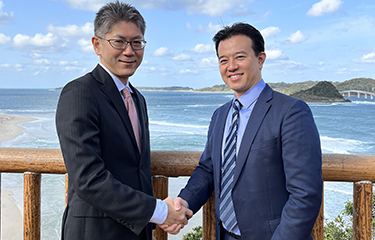Sea urchin aquaculture company Urchinomics has secured the world's first voluntary blue carbon credit for kelp-bed restoration.
Urchinomics is based in IJmuiden, the Netherlands. Its Tokyo-based Japanese subsidiary, Uninomics K.K., farms sea urchins on a commercial scale in Kunisaki, Oita Prefecture, and Nagato, Yamaguchi Prefecture. By having divers remove sea urchins from “urchin barrens” – kelp beds overgrazed by the urchins – the company allows the kelp beds to recover, which in turn sequesters carbon dioxide.
The harvested urchins, which are underfed due to the scarcity of kelp, are moved to indoor raceways on land and fed on pellets made from kelp-stem byproducts of the “kombu” seaweed industry.
On 21 November, the Japan Blue Economy Association (JBE) the Japanese state-appointed research institute tasked with establishing blue carbon credit standards validated the science and certified the voluntary blue carbon credit. Getting to that point, Urchinomics CEO and Founder Brian Tsuyoshi Takeda told SeafoodSource, required new thinking.
“Blue Carbon has historically been focused on mangroves, seagrass meadows, and salt marshes because the sequestration methodology was similar to established, terrestrial carbon (organic matter deposits directly into the soil where the plant is growing),” he said in an email. “But as the science was still early, kelp was initially left out of the blue carbon discussion. But now, at least in Japan, the science has come sufficiently far that it was recognized to satisfy voluntary blue carbon credit levels of certainty.”
Voluntary blue carbon credits from wild kelp restoration were first recognized in Japan when JBE published its methodology for quantifying carbon sequestration by kelp in 2022. Eneos Holdings, Inc., Urchinomics´ investor in Japan, actively supported and funded the necessary scientific research to quantify the positive ecological impact Urchinomics' business generates and estimate how much carbon is sequestered from the restoration of kelp forests.
“Urchinomics submitted our restoration data to Japan Blue Economy following their kelp carbon methodology, and received the world’s first voluntary blue carbon credit for wild kelp forest restoration,” Takeda said.
A “voluntary” carbon credit cannot be used for compliance with regulations, such as a “cap-and-trade” system. Rather, they are purchased by companies that want to voluntarily offset their carbon emissions in order to make a claim of carbon neutrality.
Voluntary credits tend to be cheaper because they cannot be used in compliance markets. According to a 2020 World Bank report, carbon prices on the voluntary carbon market start at less than USD 1.00 (EUR 0.93) per metric ton of carbon dioxide equivalents (CO2e) and increase to USD 119 (EUR 111) per metric ton of CO2e. Smaller recent projects also address some of the U.N. Sustainable Development Goals (SDGs) tend to be priced higher.
“Blue carbon is often seen as a higher-quality carbon credit, as ocean-based ecosystems like kelp forests contribute not just to carbon sequestration, but to a host of other co-benefits like biodiversity, oxygen production, absorption of excess nitrogen from agricultural runoff, reduced ocean acidification, and protection from wave-related erosion,” the company said. “In 2021, voluntary blue carbon credits certified by JBE averaged a sales price of JPY 72,400 (USD 536, EUR 500) per ton, well above all types of carbon credits anywhere around the world, owing primarily to their co-benefits.”
In Japan, the government and Nippon Keidanren (Japan Federation of Economic Organizations) have backed the J-Credit Scheme as a marketplace for voluntary carbon credits. According to JBE, the process to integrate voluntary blue carbon credits into J Credits, will begin in 2023.
Photo courtesy of Urchinomics







